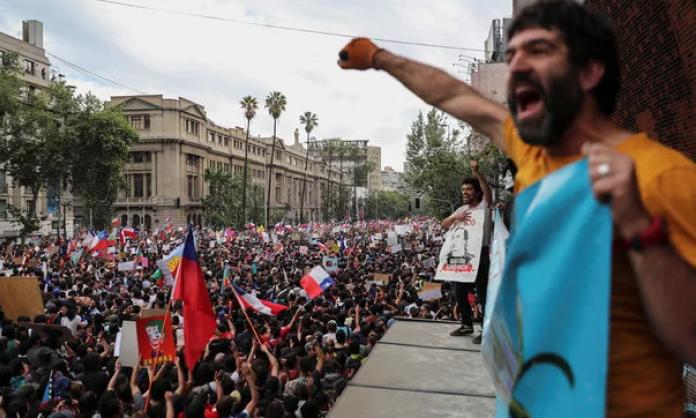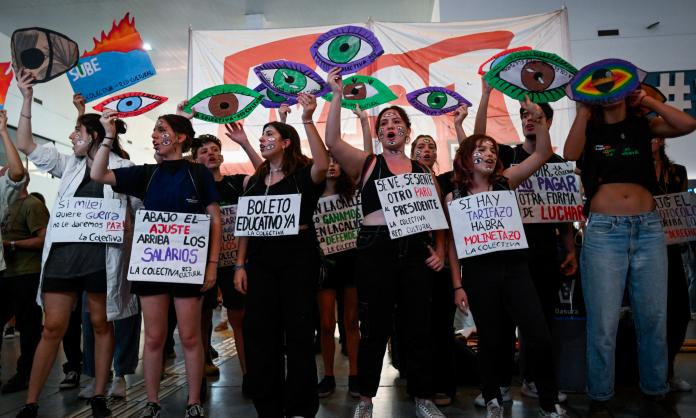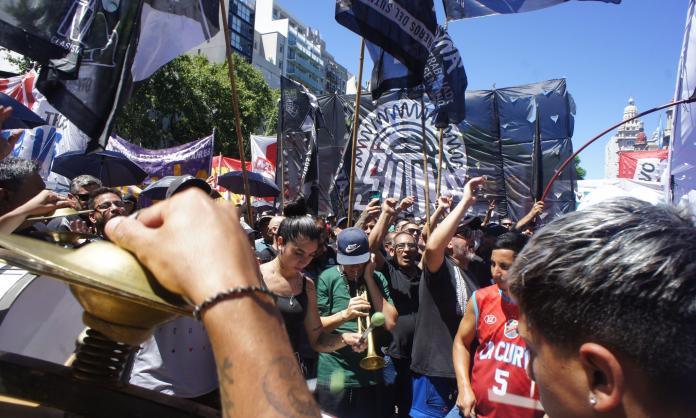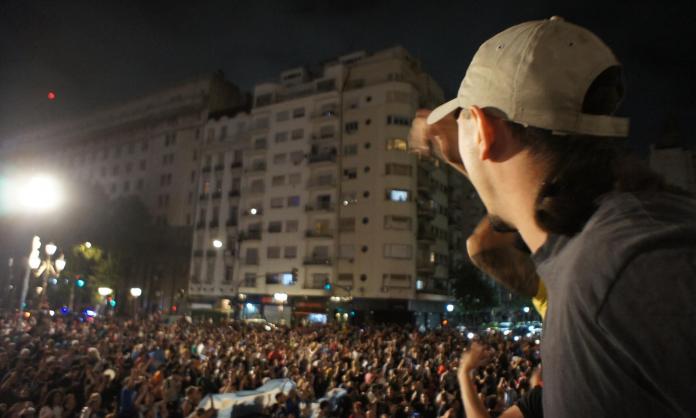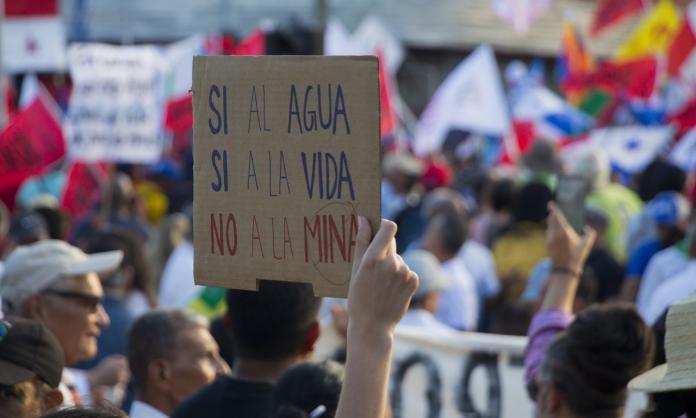The lyrics of Chilean musical group Quilapayún are known by millions around the world: “El pueblo unido jamas sera vencido, La patria está forjando la unidad. De norte a sur se movilizará”. (The people united will never be defeated, the country is building unity, from north to south it will mobilise.) The song was written in June 1973, only months before the brutal repression of the Chilean working class by the dictator Augusto Pinochet, who assumed power in September. Over the last week in Chile, these lyrics have been heard loudly throughout the country in a united way.
On 13 October, the government of billionaire president Sebastián Piñera announced a metro fare increase of 30 pesos (about six cents) during rush hour. Secondary school students, who have led anti-government mobilisations over the last decade, immediately began a protest of fare evasion. Discontent and resistance have been building throughout Chile since the restoration of parliamentary democracy in 1990. However, the current mobilisation is by far the largest since Pinochet’s fall and politically is the most significant. For the first time in decades, people have lost the fear to protest that has been so embedded because of memories of the 17 years of brutal military dictatorship.
The movement quickly developed from a protest against the metro fare rise to one against 30 years of neoliberal shock therapy. Opposition is both broad and nationwide. There have been many reports of tens of thousands of people demonstrating in every major city and various smaller towns and areas throughout Chile. Video footage has been shared around the world showing the brutal repression imposed by the carabineros (Chilean police force). The violence has been directed not only against those involved in the protests, but also against civilians displaying sympathy with the protest movement. Brutal scenes of police violence have been reminiscent of those under Pinochet.
There are reports that Baquedano metro station in Santiago, the capital, was turned into an imprisonment camp and torture chamber – one video emerged showing prisoners forced to run naked in front of military personnel while being beaten. Since then, the authorities have reportedly cleaned up the station and removed any evidence of human rights abuses. The Piñera government also imposed a state of emergency that instituted an overnight curfew for the first time since the overthrow of Pinochet.
More than 10,000 troops have been deployed throughout the country to repress the protest movement. There is video footage showing them going door to door during the night arresting those who participated in the protests. Other footage shows carabineros randomly hitting people along the side of the road with batons and raiding and looting shops and filling their cars with TVs and other electronic devices. The director general of the carabineros told reporters: “We are not trained to harm the community; on the contrary, we are here to serve the community”, while Piñera said that the government is “at war with a horrible enemy”. The footage and the statements have only fuelled the protest movement, which has lost the fear that has haunted the population since 1973.
Toward the end of October, in an attempt to quell the mass protest movement, Piñera changed his tone. “It is true that problems accumulated for many decades and that different governments were not able to recognise this situation in all its magnitude”, he said. “I recognise and apologise for this lack of vision.” The president pledged to increase the minimum pension by 20 percent and increase the state’s contribution for the middle classes and women, fast-track a law to introduce a state critical illness cover, cut prices of medicines for the poor and guarantee a minimum wage of US$480 a month. However, the government’s true thoughts were betrayed by Cecilia Morel, Piñera’s wife, who was recorded saying: “We’ve been overrun, it’s like an alien invasion. We’re going to have to cut back on our privileges and share with the rest of them”.
The concessions have done little to quell the protest movement that so rapidly moved from being anti-fare-rise to demanding more systemic changes. Piñera hoped to coopt some of the opposition, following his promises of concessions with a proposal for cross-party negotiations. Those who have agreed, such as the Christian Democrats, have been condemned by the protest movement, which called a two-day general strike on 23-24 October and called for the largest march in Chilean history to take place on 25 October. The movement is not interested in small reforms.
Many worker organisations supported the strike and have since called for further political and industrial action. The CUT (Central Union of Workers) supported the two-day general strike. However, initial support from it and other unions was for a national strike but with workers staying home. Mass pressure forced them to support a national mobilisation of protest action. Other worker organisations have called for consejos comunales (communal councils) reminiscent of those formed by workers under the socialist government of Salvador Allende to defend against Pinochet’s impending coup. The Chilean dock workers’ union stated: “We are committed to political and social change and thus propose that the union movement demand a constituent assembly of workers and the people. Only such an assembly would be able to discuss a new political, industrial model of development, labour relations, the re-nationalisation of copper and natural resources”.
Most protesters agree with this sentiment. They are increasingly viewing this as a moment of potential to dramatically reconfigure the political terrain. A central demand is for the abolition of the constitution, which was introduced on 11 September 1980 by Pinochet. Though some changes have been made, the framework remains. For example, Article 22 states: “Chileans have the fundamental duty to honour their fatherland, to defend its sovereignty and to contribute to the preservation of national security and the essential values of the Chilean tradition”. Article 23 states: “The law will establish ... penalties to be applied to trade union leaders who intervene in political partisan activities and to the leaders of political parties who interfere in the functioning of trade union organisations”.
Many laws limit union activists from participating in political structures and criminalise political activity. Furthermore, under the façade of democracy, Chile is firmly controlled by the military and the carabineros, which violently repress any signs of civil unrest. Their role is firmly enshrined in the constitution as the force that governs public order. With little to no oversight of their actions, the carabineros can impose their will with little official scrutiny.
**********
Chile is considered exceptional in South America – a beacon of wealth and stability seemingly untouched by the continent’s recent history of left wing insurgencies and governments. So the outbreak of this movement has caused alarm in establishment circles. “If it can happen in Santiago, it could happen anywhere. That is the uncomfortable message that the rest of the world should take from the sudden breakdown of civil order in Chile”, John Authers, a senior editor at Bloomberg, wrote the day before the general strike.
But Chile’s status as one of the wealthiest countries in Latin America hides the reality that the political and social system has not fundamentally changed since the dictatorship, and the country has undergone a ruthless neoliberal experiment since the early 1990s. The country has one of the highest levels of economic disparity in the world, and the government spends a smaller share of total economic output than every other nation in the OECD. The incomes of the richest 10 percent are around 26 times the incomes of the poorest 10 percent of the population. Much of the tax on higher income earners is avoided, while the poor are forced to pay ever increasing taxes and higher costs of living such as in housing, education, health and basic food.
Though the mobilisations have been the largest in decades and there is a great unity of the people, there is a lack of political leadership by the traditional left parties and a large section of the trade union movement. Despite opposition parties’ passionate speeches in the Congress, including by the Communist Party, they push for a negotiated settlement and reforms rather than fundamental change. A political realignment is taking place, bringing together a coalition of new political leaders who do not want to participate in the current political structures.
“The student protests had clear leadership and very clear and defined demands. These protests have no leadership structure. They’re decentralised, dispersed. People are protesting for all kinds of different reasons”, Jennifer Pribble, an associate professor of political science at the University of Richmond, said in an interview with US journal Foreign Policy. “It’s a much more difficult line to respond to because you have no one to sit down at the table with.”
This is significant, as it has galvanised a broader layer of people on a national scale outside of the control of the traditional left parties that have, in most cases, lost significant credibility. Though sections within these established organisations – such as the Communist Party and the CUT – still hold on to revolutionary ideas, many have become comfortable within the current political and social terrain and are unwilling to take the protest movement onto the streets.
It is unclear how long this rebellion will last and what changes it may achieve, but there is no doubt that Chile desperto – Chile has awoken. Decades of brutal repression under Pinochet and decades of repression under so-called democracy have not destroyed the people’s willingness to fight back. The younger generation, which has experienced only neoliberal democracy, is fed up with the inequality and lack of opportunity and is uniting with the older generation that experienced Allende and 17 years of brutal dictatorship. For the first time since the late 1960s, in the words of Chilean musical group Inti lllimani, there is the real feeling that “esta vez no se trata de cambiar un presidente, sera el pueblo quien construya un Chile bien diferente”. (This time it is not just about changing a president, but the people will construct a very different Chile.)




